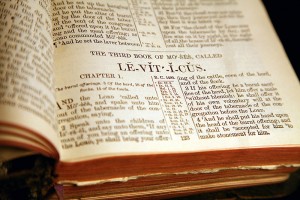Outline of Leviticus
Leviticus is divided into to main parts. Chapters one to 16 deal with laws of sacrifice and purification. In the second section (chapters 17–25), Elohim sets forth his demands for holy living that his people might maintain a right relationship with him. Chapter 26 lays out the blessings and curses for obedience to YHVH’s commands. The final chapter of the book ends with some miscellaneous laws.
- The five main offerings (Lev 1–7)
- The ordination of priests (Lev 6:8–7:38)
- Laws of cleanliness (food, childbirth, diseases, etc.) (Lev 11–15)
- Day of Atonement (Lev 16–17)
- Moral laws regulating relationships between humans (Lev 18–20)
- Regulations for priests, the offerings of the annual feasts (Lev 21:1–24:9)
- Punishment for blasphemy, murder, etc. (Lev 24:10–23)
- The Sabbatical year, Jubilee, land laws, slavery (Lev 25)
- Blessings and curses (Lev 26)
- Regulations pertaining to vows made to YHVH (Lev 27)
Themes and Main Points of Leviticus
- Leviticus stands at the center of the Torah, and there’s a reason for this, since it shows man how to come into relationship with Elohim.
- Holiness (or set-apartness) is the key theme of Leviticus. The set-apartness of YHVH and the need for man to become set-apart (Heb. kadosh, Lev 11:44). Leviticus lays out the terms are laid out by which an unholy, profane, polluted or sinful people can come into a spiritual and even contractual relationship with their holy, morally pure and sinless Creator. It spells out the terms of the contract including penalties for its violation and blessings for adherence to it.
- Leviticus carries on to completion the giving of the Torah-law, which started in Exodus 20 and left off in Exodus 25, which firmly established Israel’s covenant constitution with Elohim with the Torah being the terms or legal corpus of that constitution.
- This book, for the first time in detail, shows man the way of expiation and forgiveness of sin, thus pointing the way in major detail to Yeshua the Messiah, the Lamb of Elohim, who was yet to come and who would ultimate take away men’s sin by his sacrifice on the cross.
- Its narrative covered probably only a month.
- It is the first book of Torah rabbinic Jews started teaching their young children, since it is believed that those who are pure in heart (i.e., children) should be engaged in the study of purity (i.e., the laws of purification and atonement—central themes of Leviticus).
- Even today, Leviticus remains the foundation for Jewish life, since it includes the laws pertaining diet, the feasts, sex, marriage, family purity, and our relationship with our fellow man.
- Leviticus is at the heart of the modern Jewish synagogue service, and forms the basis for the daily devotions of religious Jews. Jewish liturgical prayer is largely based on the Tabernacle service outlined in this book.
- The offerings and other ceremonies served to show the holiness of YHVH.
- YHVH can only be approached through proper and prescribed protocols.
- In Leviticus, spiritual set-apartness (holiness) is symbolized by physical perfection. All blemishes or defects symbolize man’s spiritual defects, which break his spiritual wholeness. Therefore, the religious system in Leviticus required:
- Perfect animals for sacrifices (Lev 1–7)
- Priests without physical deformity (Lev 8–10)
- A woman to be ritually purified from hemorrhaging after birth (Lev 12)
- Ritual purification from sores, burns, baldness (Lev 13–14)
- Ritual purification from a man’s bodily discharges (Lev 15:1–18
- Ritual purification after a woman’s menstrual cycle (Lev 15:19–33)
- Those with certain diseases or ailments had to leave the camp (symbolic of leaving YHVH’s Presence—like Adam and Eve leaving the Garden of Eden after they had sinned). Israelites could be readmitted to the camp (symbolic of returning to YHVH’s Presence) only after certain protocols had been performed and the person had been pronounced whole by the priests.
- In Exodus 19:6, YHVH’s call for Israel to be a kingdom of priests. As such, they were to be a light to the nations and to show Elohim’s glory to the world (Deut 4:4–8). Israel was to be YHVH earthly representation of YHVH’s kingdom on earth. Leviticus showed Israel how to walk in a set-apart (kadosh or holy) manner before YHVH and the world.



Thank you for the overview. It is still hard to understand how the Jewish people along with the sages(rabbis) feel it’s okay to add to what is written(Torah); and force(manipulate) these man made traditions full of bondage on the people. There was no reason for this to be turned into a religion(Judaism), but living a set-apart life to Yehovah. No wonder they did not recognize Yeshua and most still do not today. When you are not lead by YHVH spirit, your led by another spirit that is what’s apparent to me. Just a thought.